
Jesse Alexander Helms Jr. was an American politician. A leader in the conservative movement, he served as a senator from North Carolina from 1973 to 2003. As chairman of the Senate Foreign Relations Committee from 1995 to 2001, he had a major voice in foreign policy. Helms helped organize and fund the conservative resurgence in the 1970s, focusing on Ronald Reagan's quest for the White House as well as helping many local and regional candidates.
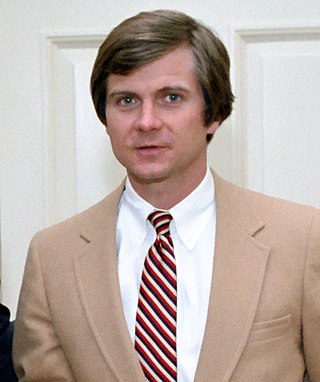
Harvey LeRoy "Lee" Atwater was an American political consultant and strategist for the Republican Party. He was an adviser to Republican U.S. presidents Ronald Reagan and George H. W. Bush and chairman of the Republican National Committee. Atwater aroused controversy through his aggressive campaign tactics, especially the Southern strategy.

Howard Henry Baker Jr. was an American politician, diplomat and photographer who served as a United States Senator from Tennessee from 1967 to 1985. During his tenure, he rose to the rank of Senate Minority Leader and then Senate Majority Leader. A member of the Republican Party, Baker was the first Republican to be elected to the US Senate in Tennessee since the Reconstruction era.
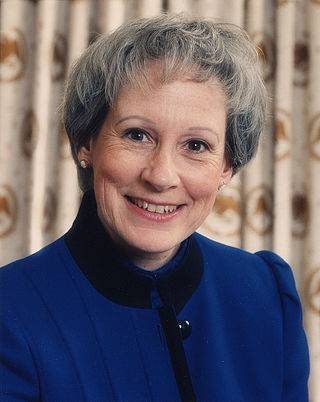
Nancy Josephine Kassebaum Baker is an American politician who represented the State of Kansas in the United States Senate from 1978 to 1997. She is the daughter of Alf Landon, who was Governor of Kansas from 1933 to 1937 and the 1936 Republican nominee for president, and the widow of former Senator and diplomat Howard Baker.
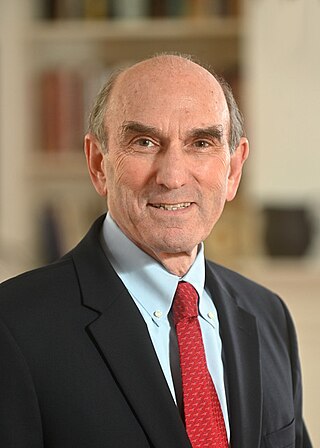
Elliott Abrams is an American politician and lawyer, who has served in foreign policy positions for presidents Ronald Reagan, George W. Bush, and Donald Trump. Abrams is considered to be a neoconservative. He is currently a senior fellow for Middle Eastern studies at the Council on Foreign Relations. He served as the U.S. Special Representative for Venezuela from 2019 to 2021 and as the U.S. Special Representative for Iran from 2020 to 2021.
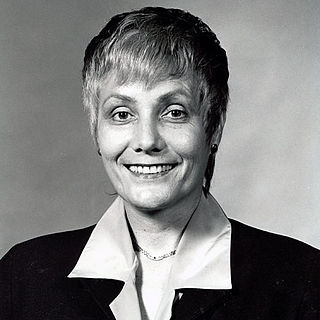
Loret Miller Ruppe was a Director of the Peace Corps and US Ambassador to Norway. She was the wife of U. S. Congressman Philip Ruppe of Michigan.

Robert Schwarz Strauss was an influential figure in American politics, diplomacy, and law whose service dated back to future President Lyndon Johnson's first congressional campaign in 1937. By the 1950s, he was associated in Texas politics with the faction of the Democratic Party that was led by Johnson and John Connally. He served as the Chairman of the Democratic National Committee between 1972 and 1977 and served under President Jimmy Carter as the U.S. Trade Representative and special envoy to the Middle East. He later served as the Ambassador to Russia under President George H.W. Bush. Strauss also served as the last United States Ambassador to the Soviet Union.
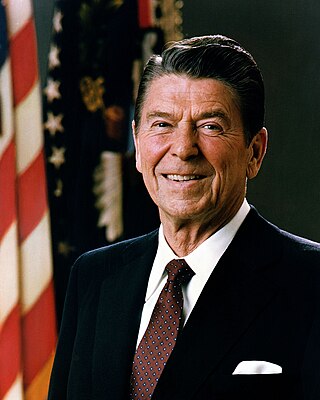
Ronald Reagan's tenure as the 40th president of the United States began with his first inauguration on January 20, 1981, and ended on January 20, 1989. Reagan, a Republican from California, took office following his landslide victory over Democratic incumbent president Jimmy Carter in the 1980 presidential election. Four years later, in the 1984 presidential election, he defeated Democrat former vice president Walter Mondale, to win re-election in a larger landslide. Reagan was succeeded by his vice president, George H. W. Bush, who won the 1988 presidential election. Reagan's 1980 election resulted from a dramatic conservative shift to the right in American politics, including a loss of confidence in liberal, New Deal, and Great Society programs and priorities that had dominated the national agenda since the 1930s.

Richard Bernard Stone was an American politician who served as a Democratic United States Senator from Florida from 1975 to 1980 and later served as Ambassador at Large to Central America and Ambassador to Denmark.

Kathleen Troia McFarland is an American political commentator, civil servant, author, and former political candidate.
Harvey Frans Nelson Jr. was an American diplomat who served as United States Ambassador to Swaziland from 1985 to 1988.
Constructive engagement was the name given to the conciliatory foreign policy of the Reagan administration towards the apartheid regime in South Africa. Devised by Chester Crocker, Reagan's U.S. Assistant Secretary of State for African Affairs, the policy was promoted as an alternative to the economic sanctions and divestment from South Africa demanded by the UN General Assembly and the international anti-apartheid movement. Among other objectives, it sought to advance regional peace in Southern Africa by linking the end of South Africa's occupation of Namibia to the end of the Cuban presence in Angola.

The United States and South Africa currently maintain bilateral relations with one another. The United States and South Africa have been economically linked to one another since the late 18th century which has continued into the 21st century. United States and South Africa relations faced periods of strain throughout the 20th century due to the segregationist, white minority rule in South Africa, from 1948 to 1994. Following the end of apartheid in South Africa, the United States and South Africa have developed a strategically, politically, and economically beneficial relationship with one another and currently enjoy "cordial relations" despite "occasional strains". South Africa remains the United States' largest trading partner in Africa as of 2019.
During President Ronald Reagan's presidency, he nominated two people for the Supreme Court and at least twelve people for various federal appellate judgeships who were not confirmed. In some cases, the nominations were not processed by the Democratic-controlled Senate Judiciary Committee before Reagan's presidency ended, while in other cases, nominees were rejected by the Senate Judiciary Committee or even blocked by unfriendly members of the Republican Party. Three of the nominees were renominated by Reagan's successor, President George H. W. Bush. Two of the nominees, Ferdinand Francis Fernandez and Guy G. Hurlbutt, were nominated after July 1, 1988, the traditional start date of the unofficial Thurmond Rule during a presidential election year. Eight of the thirteen seats eventually were filled by appointees of President George H. W. Bush.
Leonardo Neher was an American diplomat. He was the United States Ambassador to Burkina Faso from 1984 to 1987.
Since 1980, the Republican Party of the United States has held debates between candidates for the Republican nomination in presidential elections during the primary election season. Unlike debates between party-nominated candidates, which have been organized by the bi-partisan Commission on Presidential Debates since 1988, debates between candidates for party nomination are organized by mass media outlets.
Theodore C. Maino was a political appointee who served as the American Ambassador to Botswana. A close friend of William P. Clark Jr. and an avid big game hunter, the construction company executive “ asked the White House to appoint him Ambassador to Kenya, a country whose game parks are among the best in the world.” The post wasn't available but in October 1982, he was off to Botswana as Ambassador. He served until 1985.,
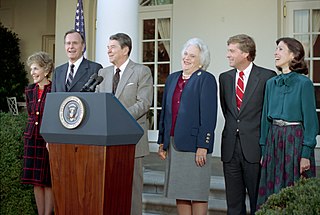
The presidential transition of George H. W. Bush began when then-Vice President Bush won the United States 1988 United States presidential election, becoming the president-elect, and ended when Bush was inaugurated at noon EST on January 20, 1989.

The presidential transition of Ronald Reagan began when he won the 1980 United States presidential election, becoming the president-elect, and ended when Reagan was inaugurated at noon EST on January 20, 1981.













